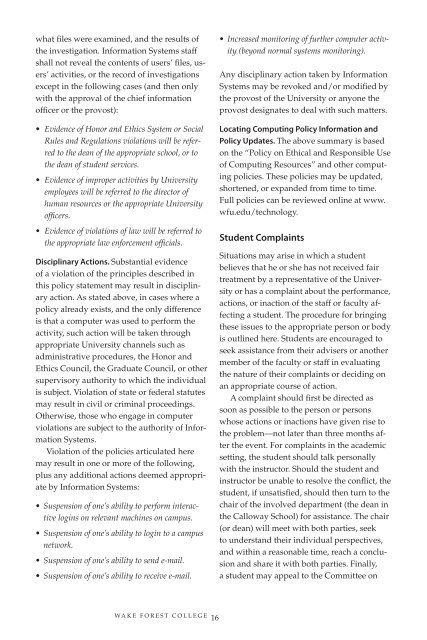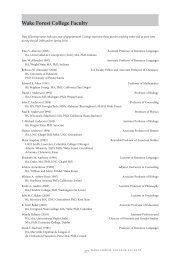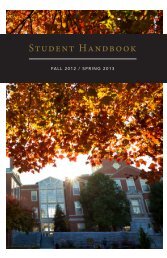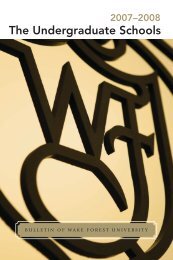theundergraduateschoo ls - Wake Forest University
theundergraduateschoo ls - Wake Forest University
theundergraduateschoo ls - Wake Forest University
Create successful ePaper yourself
Turn your PDF publications into a flip-book with our unique Google optimized e-Paper software.
what files were examined, and the results of<br />
the investigation. Information Systems staff<br />
shall not reveal the contents of users’ files, users’<br />
activities, or the record of investigations<br />
except in the following cases (and then only<br />
with the approval of the chief information<br />
officer or the provost):<br />
• Evidence of Honor and Ethics System or Social<br />
Rules and Regulations violations will be referred<br />
to the dean of the appropriate school, or to<br />
the dean of student services.<br />
• Evidence of improper activities by <strong>University</strong><br />
employees will be referred to the director of<br />
human resources or the appropriate <strong>University</strong><br />
officers.<br />
• Evidence of violations of law will be referred to<br />
the appropriate law enforcement officia<strong>ls</strong>.<br />
Disciplinary Actions. Substantial evidence<br />
of a violation of the principles described in<br />
this policy statement may result in disciplinary<br />
action. As stated above, in cases where a<br />
policy already exists, and the only difference<br />
is that a computer was used to perform the<br />
activity, such action will be taken through<br />
appropriate <strong>University</strong> channe<strong>ls</strong> such as<br />
administrative procedures, the Honor and<br />
Ethics Council, the Graduate Council, or other<br />
supervisory authority to which the individual<br />
is subject. Violation of state or federal statutes<br />
may result in civil or criminal proceedings.<br />
Otherwise, those who engage in computer<br />
violations are subject to the authority of Information<br />
Systems.<br />
Violation of the policies articulated here<br />
may result in one or more of the following,<br />
plus any additional actions deemed appropriate<br />
by Information Systems:<br />
• Suspension of one’s ability to perform interactive<br />
logins on relevant machines on campus.<br />
• Suspension of one’s ability to login to a campus<br />
network.<br />
• Suspension of one’s ability to send e-mail.<br />
• Suspension of one’s ability to receive e-mail.<br />
WA K E F O R E S T C O L L E G E 16<br />
• Increased monitoring of further computer activity<br />
(beyond normal systems monitoring).<br />
Any disciplinary action taken by Information<br />
Systems may be revoked and/or modified by<br />
the provost of the <strong>University</strong> or anyone the<br />
provost designates to deal with such matters.<br />
Locating Computing Policy Information and<br />
Policy Updates. The above summary is based<br />
on the “Policy on Ethical and Responsible Use<br />
of Computing Resources” and other computing<br />
policies. These policies may be updated,<br />
shortened, or expanded from time to time.<br />
Full policies can be reviewed online at www.<br />
wfu.edu/technology.<br />
Student Complaints<br />
Situations may arise in which a student<br />
believes that he or she has not received fair<br />
treatment by a representative of the <strong>University</strong><br />
or has a complaint about the performance,<br />
actions, or inaction of the staff or faculty affecting<br />
a student. The procedure for bringing<br />
these issues to the appropriate person or body<br />
is outlined here. Students are encouraged to<br />
seek assistance from their advisers or another<br />
member of the faculty or staff in evaluating<br />
the nature of their complaints or deciding on<br />
an appropriate course of action.<br />
A complaint should first be directed as<br />
soon as possible to the person or persons<br />
whose actions or inactions have given rise to<br />
the problem—not later than three months after<br />
the event. For complaints in the academic<br />
setting, the student should talk personally<br />
with the instructor. Should the student and<br />
instructor be unable to resolve the conflict, the<br />
student, if unsatisfied, should then turn to the<br />
chair of the involved department (the dean in<br />
the Calloway School) for assistance. The chair<br />
(or dean) will meet with both parties, seek<br />
to understand their individual perspectives,<br />
and within a reasonable time, reach a conclusion<br />
and share it with both parties. Finally,<br />
a student may appeal to the Committee on






